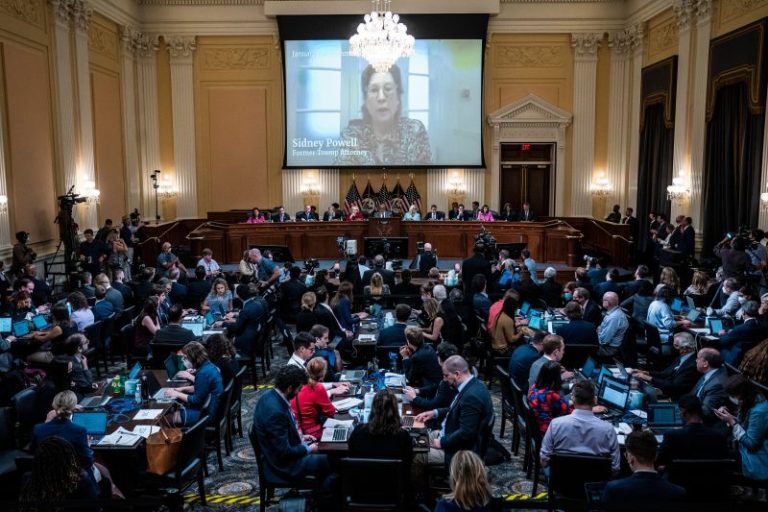We don’t yet know how legally significant Sidney Powell’s testimony will be in the case against Donald Trump in Fulton County, Ga., after Powell, a lawyer he worked with to overturn the 2020 election, cut a plea deal.
But judging by her comments to prosecutors last month, it might not be terribly flattering when it comes to how well Trump wielded his enormous power.
In recent months, Trump has turned to baselessly insinuating and even outright saying President Biden isn’t really in charge at the White House. He has gone so far as to posit that Biden is actually taking his cues from former president Barack Obama.
But to hear Powell tell it, it was Trump who — at one of the most consequential times in recent presidential history — wasn’t really in charge.
Powell claimed to prosecutors in the interview — a “proffer” session that was required as part of her plea deal — that she was effectively thwarted from becoming a special counsel despite Trump’s wishes.
The reason? Because White House counsel Pat Cipollone “was running the show more than Trump was.”
Powell claimed that Trump asked Cipollone at a Dec. 18 Oval Office meeting about getting Powell a security clearance. But she recalled Cipollone saying, “You can name her anything you want, Mr. President, and nobody’s going to pay a bit of attention to it.”
“I will remember this all my life,” Powell said, adding: “I don’t care who the president is. To have White House counsel say that I find absolutely terrifying. I mean, who is the president?”
Cipollone has not responded to a request for comment. But after Powell testified in May 2022 to the House Jan. 6 committee about such a scene, Cipollone testified that it wasn’t “the whole story.”
“I don’t think Sidney Powell would say I thought it was a good idea to appoint her special counsel,” Cipollone said then. “I was vehemently opposed; I didn’t think she should be appointed to anything.”
Cipollone also indicated that a special counsel who was not appointed by the Justice Department would lack the kind of subpoena power that they would need. That could certainly explain why he might say nobody would pay attention to a Trump-appointed special counsel’s work. And Trump’s campaign had previously been prevailed upon to distance itself from Powell in mid-November 2020.
Cipollone testified that Powell as special counsel “was not going to happen as far as I was concerned.” But he emphasized “that was the president’s decision.”
One way to look at this is that Powell’s claim feeds into baseless far-right accusations about the nefarious “deep state” thwarting Trump. Powell also has her own credibility problems, including spouting wild and debunked claims even in the same interview with prosecutors. (At one point, she claimed that George W. Bush “stole Ohio in 2004.”)
But it’s also a remarkable commentary on the former commander in chief’s ability to actually lead — and from an ally. To have him be thwarted so easily by a top White House lawyer, even when Trump was looped into the debate over what would happen? To suggest Trump wasn’t actually “running the show” in his own White House?
It sounds a lot like the way Trump has described Biden.
“I believe it’s the people that are surrounding him” that are in charge, Trump baselessly alleged last month in Iowa.
Trump, in another interview, alluded to “whoever the president is” — similar to Powell’s “who is the president.” At another point, he suggested without any evidence that it was actually Obama in charge.
“Obama has plenty to deal with,” Trump said. “I call him Biden’s boss.”
Again, there is no evidence for this.
Trump’s allies have planned for a potential second term by lining up loyal allies to serve in key administration and even bureaucratic posts — the idea being that there would be less resistance to Trump’s ideas. The guardrails would be removed.
There is plenty of reporting about White House aides and others striving to control information flow and access to Trump, while he was president, and trying to rein in his most unwieldy impulses.
But implicit in the second-term plans is the idea that Trump, the self-reputed dealmaker and leader without comparison who famously intoned that “I alone can fix it,” wasn’t actually able to overcome those around him to “fix it.”
Now an ally who invested significantly in Trump, at increasingly large personal cost, suggests that he wasn’t able to control even something that was so near and dear to him: his effort to cling to power.

